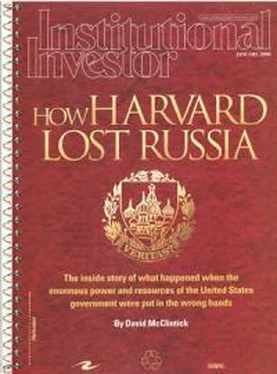Shleifer and Hay immediately assigned a lawyer to coordinate Harvard's response to the audit: Washington attorney Michael Butler, whom they had used as a troubleshooter in recent months and who became known in HIID circles as "Mr. Fix-it."
In early April, as the audit was beginning, Hay, Hebert and Zagachin flew to Boston. Hebert had been cultivating a relationship with AEW's Aldrich and had scheduled a meeting with him and two of his aides. Aldrich was more receptive than he had been in November. One meeting turned into six spread over two days.
Hebert told the group that she expected to receive one of the first -- if not the first -- registrations to operate a mutual fund company in Russia. "I'm at the head of the queue," she said, noting that she expected Zimmerman and Farallon Fixed Income Associates, as well as Farallon Capital Management in San Francisco, to back her financially.
"Beth said she had a trusting relationship with the Russian SEC," Aldrich recalled later.
On the second day Hay spoke to the AEW group, explaining how strongly RSEC head Vasiliev supported Hebert's venture and how important Yeltsin considered mutual funds to his reelection.
Though Aldrich's people liked Hebert's plan, Hay gave them pause. "Jonathan struck me as someone who was very academically inclined," aide Jeffrey Hammer said later. "I was somewhat bemused that Peter Aldrich introduced him to us. Jonathan did not seem to have, quite frankly, business acumen."
Still, it was clear that Hay had influence with the Russian officials who would award the first mutual fund registration and that he was committed to helping Hebert and Zagachin raise money. He assured Aldrich that nothing he was doing posed a conflict between his public responsibilities and his personal financial interests.
At the end of the second day of meetings, Hay, Hebert and Zagachin returned to the Charles Hotel off Harvard Square, where HIID put up visitors. Now that it appeared likely that the mutual fund enterprise would go forward, Hay told Zagachin that she would have to decide whether to work for HIID or for Hebert.
"You need to choose one way or the other which seat you want to sit in," Hay told Zagachin outside the hotel. "They're a different set of interests." Zagachin chose Hebert but did not resign from HIID for another four weeks.
Although Hebert had approached Aldrich for a single investment, her nascent business had evolved into two companies -- a mutual fund management operation, which would be called Pallada Asset Management, and a separate entity to provide back-office services. Hay, Hebert and Zagachin, as well as Zimmerman, believed that money could be made from both.
Zimmerman, as the potential lead investor, had solicited an investment in the management company from Farallon Capital's founder and senior partner, Tom Steyer. She also asked Hay and Hebert to fax Steyer a memorandum about the back-office company, known as a "specialized depository."
"Our advantage comes from the fact that the regulator wants us to be first . . . ," said the memo, dated May 16. "Our project will be established with the active involvement of the Russian legal team that the [RSEC] entrusted with the drafting of the original mutual fund regulation." The memo emphasized that the Russian legal team was managed by Hay himself. The same memo was faxed to Zimmerman and Shleifer. With the Russian presidential election only two months away, the Yeltsin administration was putting heavy pressure on Sokin and Vasiliev to implement the previous summer's decree promoting regulated mutual funds.
"You're a failure!" Yeltsin's prime minister, Viktor Chernomyrdin, told Vasiliev. If mutual funds weren't registered soon, Sokin said, Vasiliev could be thrown in prison. The RSEC chief was "incredibly nervous," an aide said. He was "basically hysterical," said another.
Sokin and Vasiliev in turn assailed Hay, Hebert and Zagachin for moving too slowly. "If we don't get this thing up and running, I'm going to end up in jail," Zagachin told colleagues. She would explain later that the Russian officials had made it clear to her that failure would carry "very serious repercussions."
Earlier in May the RSEC had awarded Forum Financial Group $2.5 million in World Bank funds to help create a back-office entity to be called First Russian Specialized Depository. Forum Financial CEO Keffer had been glad to get the $2.5 million, but he had been surprised by two pieces of unwelcome news. First, Forum could own a maximum of 49 percent of the FRSD -- the RSEC wanted the majority owned by Russians. Second, the RSEC wanted the FRSD to be run not by a real Russian but by the Russian-born, American-bred Zagachin. The matter-of-fact Keffer and the voluble Zagachin clashed over how to structure the company. Over the summer the animosity between them flared into a feud.
Hay, spurred by Hebert, demanded that Keffer agree to Zagachin's controlling the depository.
In the meantime, the U.S. government audit of HIID proceeded; in correspondence the General Accounting Office protested that the institute was withholding information. Washington attorney Butler, who had gone to Moscow to oversee the audit for HIID, sometimes spoke twice a day with Shleifer in Cambridge. Shleifer and Zimmerman were concerned about the Pallada and FRSD projects. Zimmerman had learned that Farallon's Steyer was lukewarm about investing. And Shleifer was nervous about possible conflicts of interest associated with his wife's involvement.
"The bottom line is, we continue having serious concerns," Shleifer informed Hay on June 9 in a fax marked "strictly confidential."
The Shleifers met with Aldrich at Zimmerman's office two days later to discuss the investment in Hebert's Pallada. Shleifer, who showed up late, appeared "very uncomfortable" and said "he really wasn't supposed to be expressing opinions on the subject," Aldrich recalled later in his deposition in the U.S. case. Zimmerman was frustrated.
"What am I supposed to do -- have a Chinese wall between me and my husband through our bedroom?" she had recently ranted to a young aide.
The secrets of the Shleifer-Zimmerman bedroom in Newton were not a trivial issue. It wasn't unusual for Zimmerman, a recognized expert on global fixed-income securities markets, to receive late-night phone calls from top Treasury officials seeking her counsel, including Summers, now deputy secretary, and David Lipton, Sachs' old Russia colleague, who was now assistant Treasury secretary for international affairs. "Our little world," Summers called the small cluster of government officials and private sector players who were in frequent touch. And it wasn't unusual for Shleifer to get calls at the same hour from Hay and others in Moscow, where it was early morning, wanting to confer about the most sensitive aspects of aid to Russia as well as their personal investments.
Yet as frustrated as they were with Russia, Shleifer and Zimmerman also had another subject to discuss with Aldrich: the education of their four-year-old son. The couple had visited the Shady Hill School, an elite, private elementary school in Cambridge. They were "tremendously impressed" and "desperately wanted" their son to be admitted, Aldrich recalled later, but had been dismayed to learn that "there were very few spaces." Could Aldrich use his contacts to help? He promised to try.
Zimmerman's meeting with Aldrich was a success: An Aldrich aide agreed in principle that AEW would invest $50,000 in Hebert's fund management company against an eventual total of at least $200,000. He prepared a draft deal memo which stated that his firm would invest on the condition that "Nancy Zimmerman and Andrei Shleifer would be invited to participate on favorable terms with the invitation coordinated through AEW Boston."
Hebert, assured that the RSEC would register her company soon, ahead of more-qualified competitors such as CSFB and Pioneer Group, resigned from Fleming at the end of June.
Читать дальше






![Джонатан Димблби - Barbarossa - How Hitler Lost the War [calibre]](/books/385421/dzhonatan-dimblbi-barbarossa-how-hitler-lost-the-w-thumb.webp)





